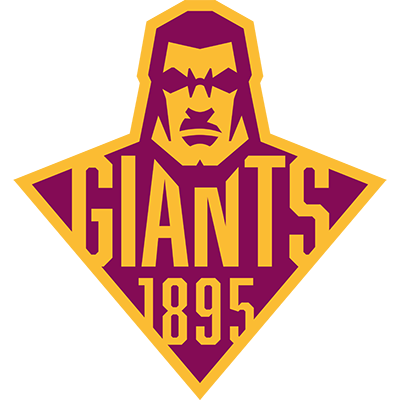11 Aug 2022
The Long Read: The Turning Point
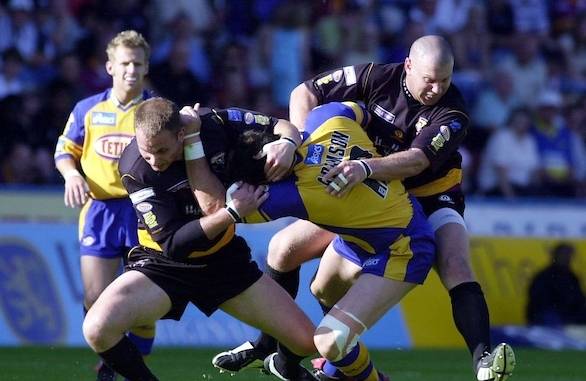
By Conor Murphy & Harry Dennis
The date is July 12th 2003 at the Alfred McAlpine Stadium. It's Huddersfield vs Leeds, 1st vs 10th, in the Birthplace of Rugby League's first season back in the top flight since the ill-fated first spell in the Super League.
Things were going well. The club had received a few big wins on their way throughout this year in 2003, but today was different. These guys were aiming to do what no-one has done in 38 years. This is the tale of the emotional roller-coaster that was the beginning of something truly special for Huddersfield Giants.
Huddersfield's recent history to that point is best summed up by the Guardian's Andy Wilson, who wrote in 2003 "History has always hung heavily over Huddersfield's rugby league team, not so much because the Northern Union was founded in the town's George Hotel in 1895 - although they do have "birthplace of rugby league" on the club badge - but because of the Team of all the Talents who dominated the British game either side of the first world war.
"Their more recent history has been far less distinguished, with an embarrassing relaunch as the Barracudas in the mid-80s when they were struggling at the wrong end of the Second Division and their traditional home at Fartown was virtually derelict."
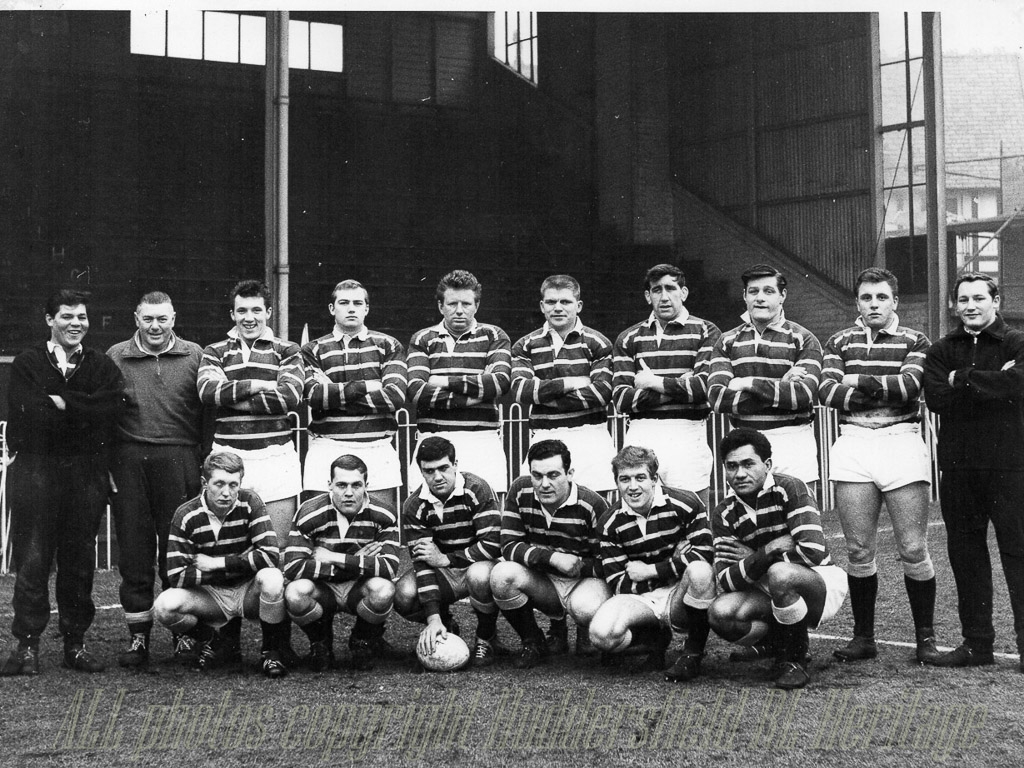
The 1965 team, the last Huddersfield side to beat Leeds before the 2003 Streak Beaters
Huddersfield had suffered in the decade previous, and the decade before that, and in fact the decade before that. The game-wide decline had been harsh on the Claret and Gold, with the 1972-73 split in the Championship into two separate divisions seeing the Fartowners compete outside the top flight for the first time.
While they would win the 1974-75 Second Division and see a return to the top flight, a period of yo-yoing occurred and after the 1978 season was completed, the 'birthplace of Rugby League' tag would weigh heavy, drifting the club to it's lowest point, amassing 10 wins and finishing 3rd bottom in 1979-80.
As mentioned by Wilson, the club attempted to turn the tide with a range of image changes, most notably renaming the club Huddersfield Barracudas and the Fartown Ground 'Arena 84'.
As one fan commented, "The only consolation was that because Ceefax couldn't put our full name on, they'd put 'Huddersfield B', so people must have thought our A team must have been playing someone else." Just about sums it up, really.
In 1988, the club that didn't think it could sink lower did so - finishing second bottom behind footballing powerhouses like Mansfield Marksmen, Springfield Borough and Runcorn Highfield. They'd best two of them the year after, the Marksmen and Runcorn, on their way to an 18th place finish as the end of the decade rushed towards them.
As the new decade emerged, Huddersfield began to show the signs of upward trajectory. Mick Murphy arrived as the head of a three-man consortium which saved the club from extinction at the beginning of the 1990s and as fellow director, Neil Shuttleworth noted "He was the man, the catalyst for the change in fortunes of the club. Who knows where we would be without Mick Murphy?"
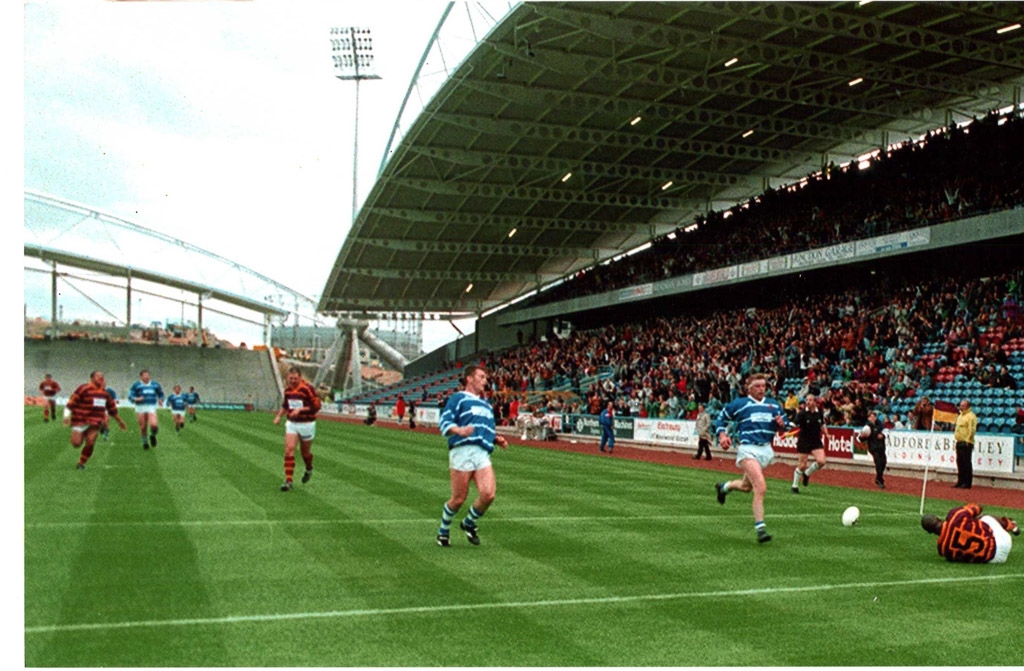
The Club moved into the Kirklees Stadium, the clubs current home in 1995 with a win against Barrow Raiders
The Club began to attract local investment, collected a better cohort of players and began to turn around as a Rugby League outfit after years of desolation.
A healthier 11th finish in 1991 was backed up with the club's first title since 1975 in 1992, winning the Third Division before a third place finish in the Second Division in 1993, a run that saw the side compete at the top, rather than the bottom of their division for the first time in nearly twenty years. They moved into the Kirklees Stadium, a brand new facility in 1995 and people began to see the club as a forward looking outfit, rather than a relic of the past.
Ken Davy took over the club as Chairman, added the Giants moniker and in 1997, won the Second Division Premiership by beating Hull Sharks 18-0 to secure promotion to Super League, returning the club back to the top flight for the first time since the seventies. Things were looking up, right?
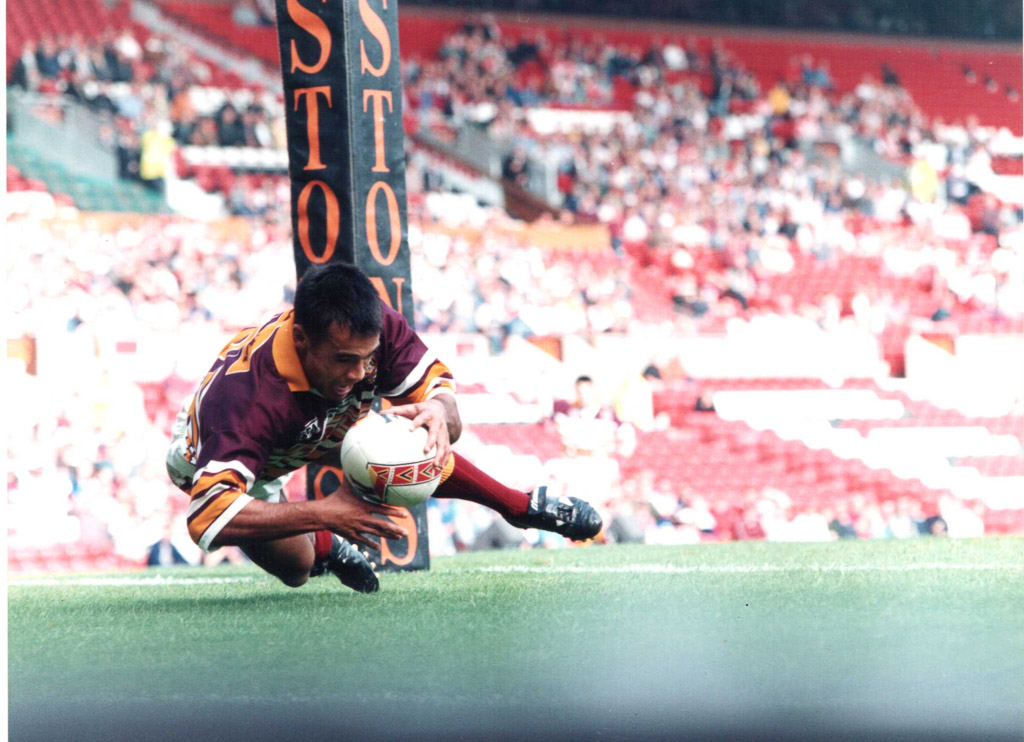
Huddersfield winning the 1997 Second Division Premiership Final at Old Trafford
Wrong. The Giants were ill-equipped for the top flight and in their first four years finished bottom each time, finishing with records that are more fitting of a bowler than a Rugby League team; 2-21 in 1998, 5-25 in 1999, 4-24 in 2000 and 6-21 in 2001, when the club was finally relegated from the Super League. However, the appointment of Tony Smith mid-way through the 2001 season offered a small glimpse of hope.
After failing to win in their first 18 games, the side rallied to six victories in the last 12 weeks and appointed Smith as coach in September 2001. In the next season, the Giants won all but one of their 2002 games, won the Buddies Cup and were promoted at a canter.
That 2002 team had literally everything. Literally. Everything. They had a free-wheeling, free-scoring Eorl Crabtree playing at Centre, the lightning quick Hefin O'Hare, a sevens player who travelled for trials with Leeds and impressed the Giants coaching staff, Chris Thorman, a silky play-maker and Giants star who's time was coming to end before it even began, having signed for London Broncos at the start of the 2002 season, and they had Stanley Gene, the hypnotic playmaker who's signature move was doing a forward roll when he scored. Just for the fun of it. That's what they were, fun.
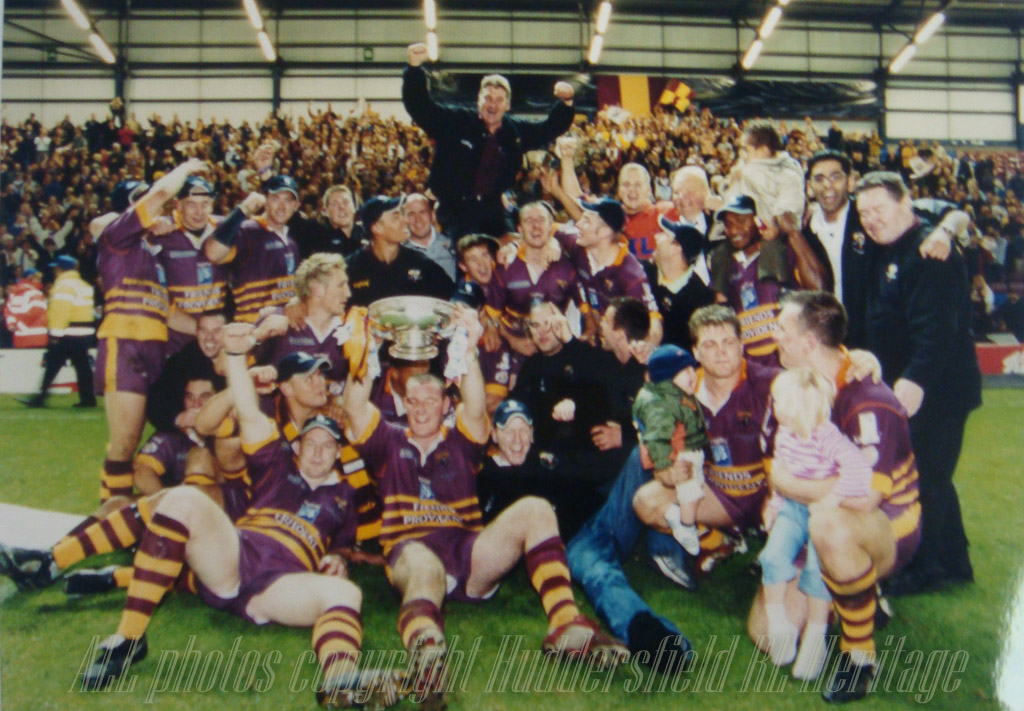
Huddersfield win the 2002 Northern Ford Premiership at AutoQuest Stadium, Widnes
Crabtree was a key part of the 2002 side, scoring 25 tries in a season, playing a centre. It was a position he'd never played before and began playing to fill in. He remembers the period as a great time to be a Giant.
"For me, it was the best years of my life. As a person and as a player, I got massive confidence from that whole unbeaten period.
"When Tony Smith came in, I played my first five games and I was probably the only player whose wage went up when we got relegated. I was told I was going to be kept on, then told that we didn't have anyone to play in centre position. I didn't ever think I'd play that, and Smith said to me 'can you play at Centre for one game in the friendlies.' I scored a hat-trick. By the first game of the year I got the Number 4 shirt.
"I don't think he was ever looking for a centre."
It was a great period for him personally, with a number of life-changing moments. Rugby League in the Northern Ford Premiership was enjoyable, and his partnership with Hefin O'Hare, who would travel down to play for England Sevens at the Commonwealth Games that summer, had the desired effect.
"I had my daughter that year, I was 19 at the time, she's 18 now - time moves so fast. I had Hefin O'Hare on the wing and we ran riot, we enjoyed ourselves on the way.
"We were unbeatable, we grew in confidence, we're all still mates to this day. We had a group of lads who wanted to play for each other. I look back on that year as the making of me and the beginning of the Huddersfield Giants."
Crabtree recalls that Rugby League was a different sport in that time, without some of the creature comforts today's players enjoy. It was a time of great change, forged by the influence of the revolutionary coach, Tony Smith.
"We didn't have a kit sponsor at the time so we wore our own kit to training and we weren't really used to video sessions, Tony Smith was really like a teacher and we were students of the game.
"It's the first time I'd ever been taught like that and coached. We learnt to analyse each other, and you had other players critiquing each other, we had to do our own stats and meters. That was pivotal in the direction we were going to go in the future, we were self taught. You were teaching yourself and the players around you. He was another level, I've never learned as much as at time time."

Stanley Gene, a key facet of the 2002 unbeaten side
One of the key men for the side Steve McNamara, the Captain and leader on the field. He'd arrived at the Giants in panicked circumstances - a financial crisis at the Wildcats had seen all players over the age of 24 released, including Steve. He was signed in 2001 and played 30 games that year, kicking 75 goals (amounting to a quarter of the teams points). In the 2002 season, he saw the success as a huge confidence booster for the club.
"The club was just starting to get its confidence back. It had been up and down a couple of times. We’d flirted with regulation, and been relegated once. We was just starting to get its confidence back as a team."
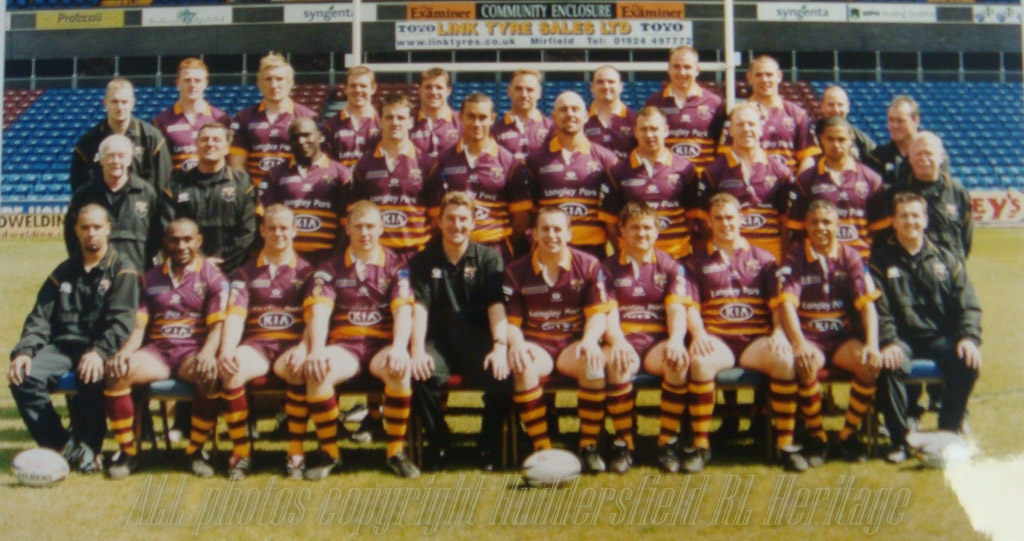
Huddersfield's 2003 Team Photo
After the unbeaten 2002 Season, the club began the process of bringing the side up to scratch for Super League. Crabtree knew that although difficult decisions had to be made, the club got themselves ready for the jump.
"We knew in 2002 we all weren't going to make the jump - some of the lads weren't going to make it to Super League. But we strengthened and we had a squad that we felt was capable of challenging, despite the constraints on the club"
"There was always an element of doubt that you were going to struggle, but there was no question whether we were going to go back to where we were. The club became more professional, we understood the game."
McNamara was aware of the constraints at the club, but felt that in Tony Smith, they had a secret weapon to regaining confidence for the first time: "Our budget was less, we didn’t quite have as many staff, so as a senior player, I was playing but also doing some coaching and helping Tony out as well at that point.
"But we felt well-coached at that stage and rather than trying to survive we were starting to try and take on the bigger teams."
"Back then after that torrid sort of relegation and recovering from that to then start putting ourselves in a position to not only compete but win against those bigger teams was the overriding feeling."
They demonstrated their ability early, with the 36-22 win over Champions St Helens in Round 4. Smith described it as "a great result for the sport of Rugby League"
"These are the kind of matches people want to see," said Smith. "The competition should be like this every week. If the team at the bottom can beat the one at the top, then it can only put bums on seats."
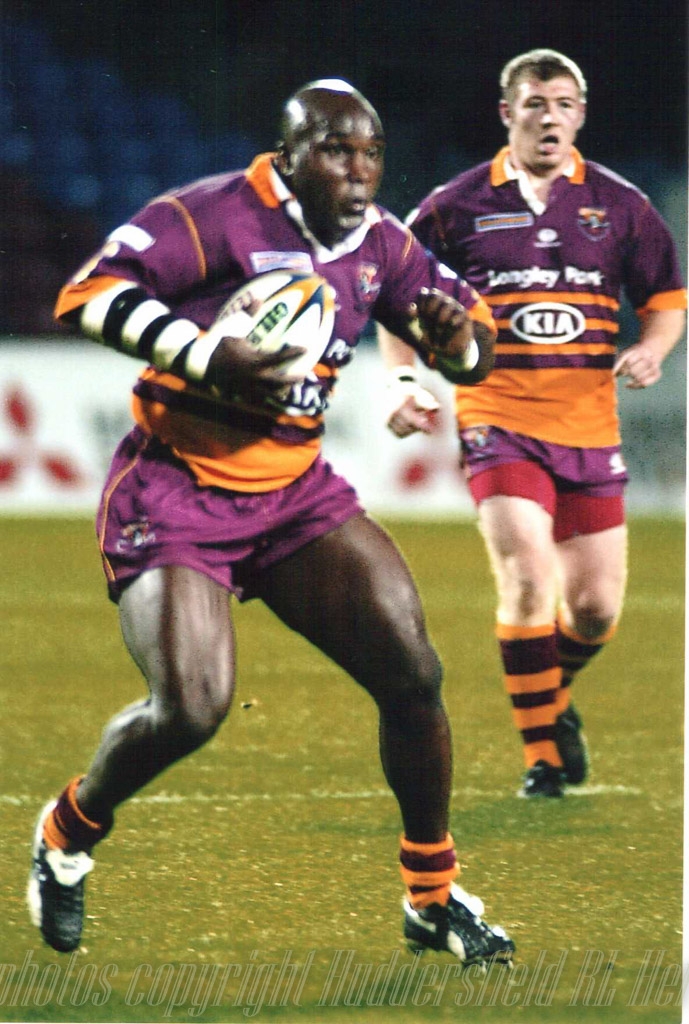
Darren Fleary in action in the 36-22 win against St Helens
That victory launched a three-match winning run, the longest in their Super League history. With a 3-4 record coming into Week 7, the club sat in 8th, it's highest ever position in the Super League era.
"I think at that stage you were probably hoping just before that period to win games but I think during that 2003 season we started to feel confident of winning those games which was a big difference" said McNamara.
Crabtree agreed.
"We didn't maybe have the talent that we had in our first four years, the Bobbie Gouldings of the world who had played at the highest possible level, we had more of an education - we understood how to make things happen and stop things as a team. We knew we could stop a few people, we had an opportunity to shock a few teams. We knew we weren't going to finish first, but we knew we were able to have a crack at making an impact."
The Giants stayed away from the foot of the ladder all season. Much of the creativity in the side fell at the feat of Brandon Costin, the man who replaced Thorman in the side as the inventive hub of the side. McNamara remembers his ability to do the unexpected.
"He could pull something out of the bag, he had the ability to come up with a special play or a big play, either a kick or a carry and he scored a few tries so it’s important that we were a hard-working team, a team that wasn’t stacked with individual talent, but it did have a player in Brandon that could break a game up for you."
The club continued to pick up results, including tense 28-26 win over Halifax at home, a victory against Wakefield away and secured their second marquee victory against Wigan in Week 17. The team, however, had their eyes on one scalp - Leeds.
Crabtree recalled the feeling in the camp leading up to that fixture: "We always looked out for that fixture. There were many painful memories in the previous four seasons that meant lots of the squad wanted to get one over on them"
Painful is an understatement. In the previous four years in the top-flight, Huddersfield had been blown out by the Blue and Amber with alarming consistency. They lost 54-4 and 72-16 in 1998, 42-20 and 86-6 in 1999, 20-10 and 48-20 in 2000 but improved their showing in 2001 - scoring 46 points... and losing 52-46.
The big games always caused nerves, said Crabtree, and that something that still effects players to this day, but noted the excitement at the challenge of making history week after week.
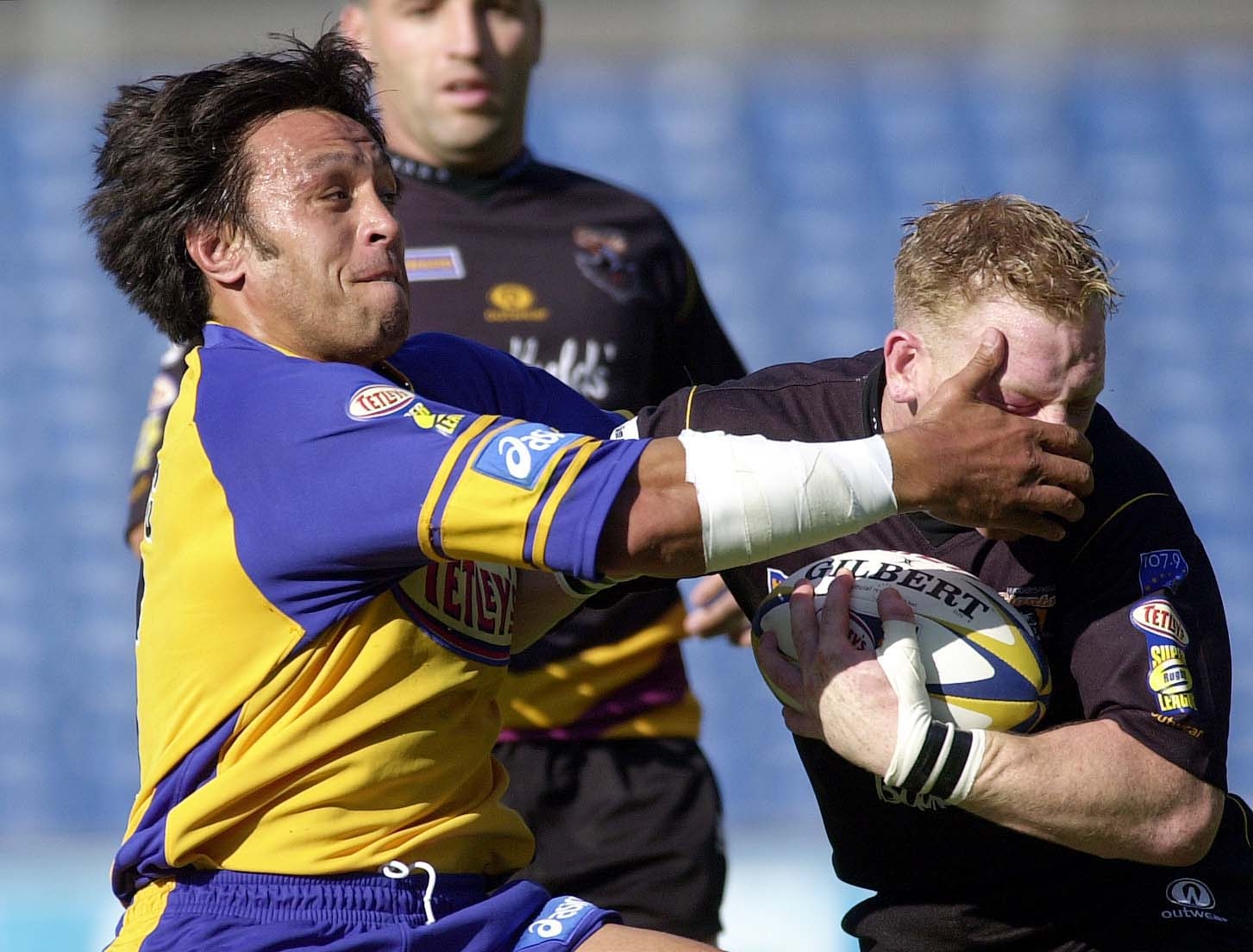
Willie Poching tackles Paul Reilly during a nervy second half
"I think the mentality of big games effected us, and I think that's still the case. We talked about little challenges, we were going inch-by-inch; the first time you beat Leeds, winning one game, winning two games. Every challenge and every victory was new and exciting. As those goals increase and get tougher, you get tougher."
This team was different, however.
"I actually remember being at home preparing for that game and knowing it was coming up and knowing it was a big game. It was a Saturday night, it’s always great to play in those, and the weather was good and we were going into that game. We were optimistic and confident that we could get it done" said McNamara.
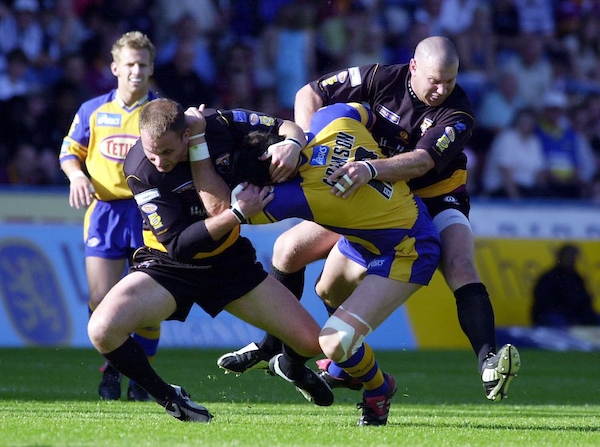
Matt Adamson is brought down by Huddersfield's Jamie Bloem and Jim Gannon
On the night of the game, McNamara felt nervous, understandably given the Giants recent record against the men from Headingley, but felt a different atmosphere in the ground that night.
"There was the general nerves before that game, it was a big game. Huddersfield weren’t renowned for big crowds but in terms of the atmosphere inside that ground, that was the thing that stood out for me."
The Game sparked to life early on, with Stanley Gene forcing a turnover after a strong tackle to score, and the Giants forcing another try in a half that had all the tough, defensive hallmarks of the 2003 Giants. Four goals from McNamara and one from Costin extended the lead to 18-6 going into the break.
Leeds struck back courtesy of their young star half, Danny McGuire, but Costin and Julian Bailey combined to restore the Giants lead to 12 points. But then the men from Leeds began to sneak into the game. Wayne McDonald and David Furner powered over to bring the sides level. Not selected for the game, Crabtree had a sinking feeling from the sidelines.
"I remember thinking... here we go again. You'd seen this so many times, and we'd played so well but Leeds were top and all I could think was they were going to do to us what they'd done time and time again over their history - sneak the win late on"
Huddersfield came back out after the kick off and forced a turnover from Barrie McDermott with around three minutes left on the clock, giving the ball to the Giants with a few minutes remaining, allowing a chance in the last few minutes to grab the one-pointer and the win. Bang in front of the posts, Steve McNamara made one more play to put the Giants in with a great shout of winning the game with seconds remaining.
Costin received the ball in good space, and positioned himself to pull the trigger. But he didn't beat the first man, it ricocheted off Kevin Sinfield's leg and bounced back into play before a Giants player pounced on the loose ball, from a seemingly offside position. The play continued, however, and referee Russell Smith wiped the tackle count and from the subsequent play, the mercurial half Costin found a gap, and reached over to score.
⏪Throwback to July 2003 and it was a momentous afternoon at the McAlpine Stadium as @GiantsRL completed their first win over Leeds in 38 years when Brandon Costin’s 79th minute touchdown sealed the long-awaited 30-24 win 🏉
Who will win this relegation four-pointer on Friday? pic.twitter.com/fj1jrL1B3T
— Sky Sports Rugby League (@SkySportsRL) July 30, 2019
Sinfield took objection with Russell Smith, with the man in the middle already a wanted man in Headingley after a controversial decision in the 2003 Challenge Cup final, which cost Leeds the game. But he wasn't going to be moved. McNamara added the extras and that was it. The game was over. The 38 year run was at an end.
Stanley Gene, who's tries set the tone for the performance, was speechless in the aftermath of the result.
"I think it's... Words can't describe it. Tony Smith is a really good coach. All these boys with no names whatsoever, we work as a team. When you work as a team you win the game. We knew, we always come. Today we stood up. I want to thank all the supporters, all the 17 plus coaching staff" he told Sky Sports at the final whistle. Smith was more reserved.
"We're doing okay at the moment.
"I'm proud of the boys, we're excited. It's a big result. We've been working hard for this for some time. We're starting to get to places. We're getting there. The guys have got to enjoy their victories. I'm not gonna analyse that too much, I'm going to enjoy it."
The focus and drive of the side was the hallmark of Smith's tenure as coach. He wouldn't remain in post long, and in a twist of fate, his victory against the Champions would end up as a pretty good interview for his next job - he was appointed as Leeds coach at the end of the season. That was all in the future however, and on the night, he insisted that the side were on course to achieve their goals for 2003 after the win.
"We've certainly got goals but we're not going to get specific about them outside our dressing room. But they took a pretty good step towards achieving them today."
Sky Sports Phil Clarke summarised the game after the whistle, and emphasised the desire and effort that permeated the team.
"It would have been an injustice if Huddersfield had not won tonight. They put more desire and effort into the game and they played the better Rugby. There were some fantastic individual performances but when you analyse why the Giants have beaten St Helens, Leeds and all the... err.. other sides it's been because they've done the small things well and been collectively better."
"The other side" in the playoff positions they beat was Wigan, Phil. Don't know why you'd forget that.
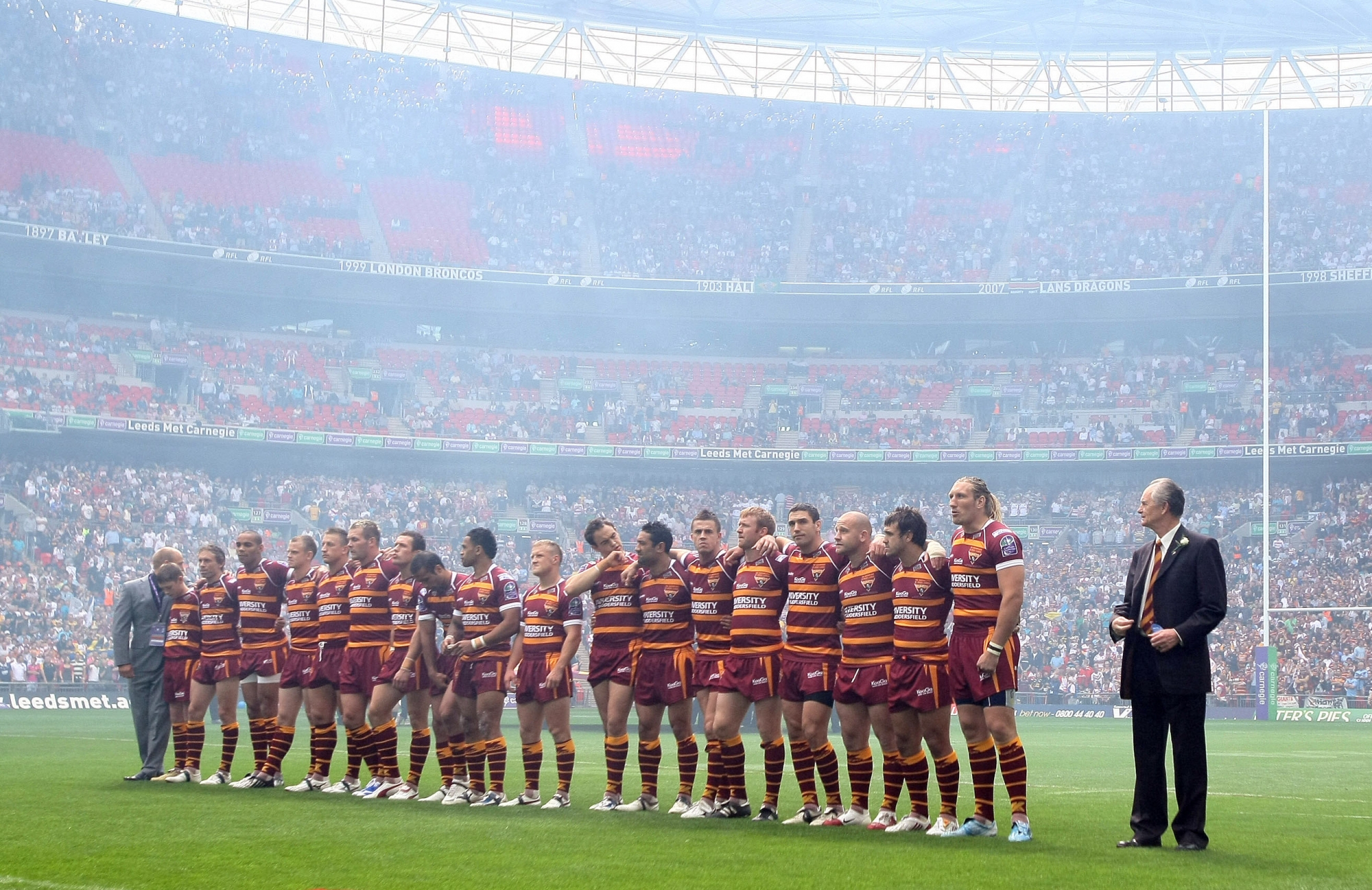
Huddersfield would go on to become a consistent side in Super League and six years later, would reach their second Challenge Cup final in three years
The elation of the game after the final whistle stuck in McNamara's mind, and he understood that the team had accomplished something truly special.
"I remember sort of the end of the game and the elation and the fact that it was a very big win for us at that stage and just the feeling in the dressing room.
"We probably weren’t in a stage there as a club to compete to win the Super League, we knew we weren’t good enough for that, and the Challenge Cup was a little bit beyond us at that stage. So really that was one of our feelings of winning a cup final if you like. It was a big game for the club. A big game for the staff and the players. So it was just a really satisfying moment."
Crabtree saw greater meaning in the victory - that it was the side that Huddersfield now had the confidence to stay the course in Super League, where they have been ever since.
"It was confirmation that we could not only play well against those teams but beat those teams. Quite often you’re involved in games and you come off and go ‘yeah, we played well, but we just didn’t quite get across the line.’
"So there was a couple of turning points there where we started to beat some of these big teams and they knew that playing Huddersfield wasn’t the same as what it had been in the previous years, and that gave the club confidence to go on and be a team that’s stayed in the Super League ever since."
Steve McNamara still feels like Huddersfield is a special place after his time there, and the win that year was a big part of that: "2003 was my last year playing and that was the end of my playing career but the start of my coaching career so one point ended and another started.
"It was an incredible end to my playing career and really the start of my coaching career. I really enjoyed the year after, having to come back, and fight to get back, and there was the elation of promotion. During that season I’d started to do little bits of coaching alongside Tony Smith.
"So it’s got a little special place there for me and, although it wasn’t good or comfortable getting relegated, the lessons learned from that have been invaluable for me moving forward."
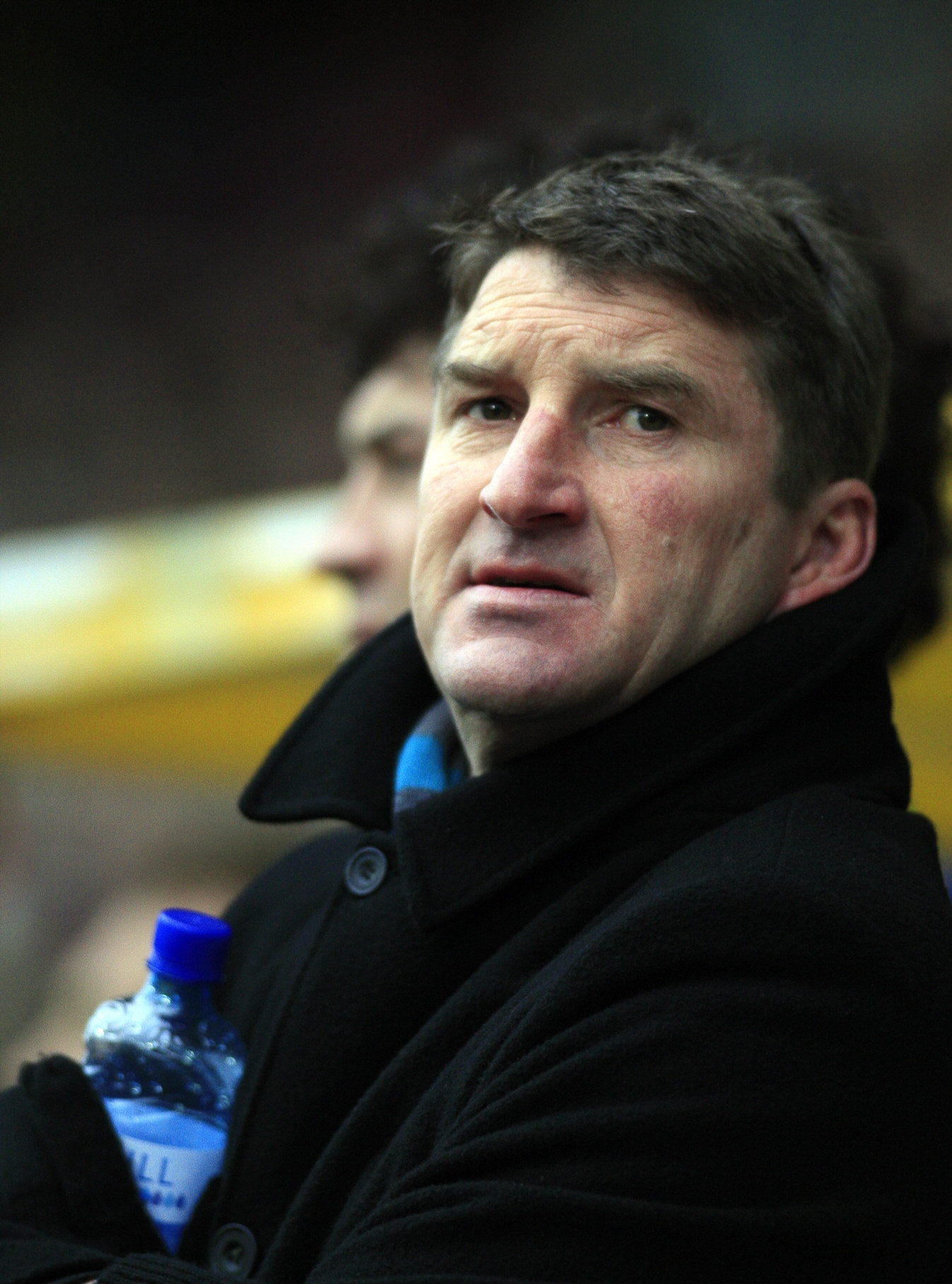
Huddersfield Coach Tony Smith would go on to coach Leeds, England, Warrington and Hull KR
Eorl Crabtree stayed, and saw the full benefit of the Giants stability in Super League in the following years. He puts the credit on the shoulders of Tony Smith and believes his influence is the reason the club have stayed in the top flight ever since.
"That, probably for us, is the most important season. It's the biggest and most pivotal season in the our history, in my opinion. It wasn't spectacular, it wasn't outstanding but Tony Smith did what no-one had managed to do. We're very fortunate to still be here and you can't take anything for granted but we're better because of the impact of that season."
So when you're watching a Giants vs Leeds game, take a minute to remember how we got here, and remember how the 2003 side, Costin, Gene, McNamara and Tony Smith, have a big claim to be the reason we're here at all.
Enjoyed this piece? You can follow Harry Dennis on Twitter here.
